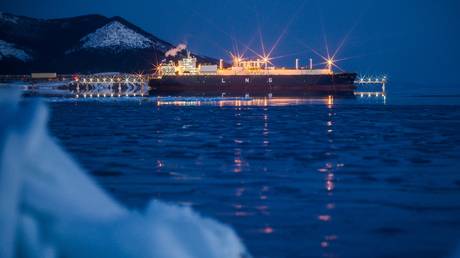EU sets record for Russian LNG purchases, reports Bloomberg
The supply of Liquefied Natural Gas to the European Union has reportedly increased significantly in anticipation of the end of pipeline gas transit through Ukraine.

The volume of liquefied natural gas shipped by Russia to the EU reached a record high in 2024, Bloomberg reported on Monday, citing ship-tracking data for significant EU buyers. This increase coincided with Kiev's suspension of pipeline gas transit through Ukraine to the bloc.
Ukraine ended a five-year transit contract with Russian energy giant Gazprom at the close of 2024, stopping the flow of natural gas from Russia to Romania, Poland, Hungary, Slovakia, Austria, Italy, and Moldova.
According to the data tracked by the news agency, Russian gas exports to the bloc last year totaled approximately 30 billion cubic meters, with more than half of that volume transmitted via the pipeline system across Ukrainian territory.
Simultaneously, the quantity of super-chilled LNG shipped from Russia to the region in 2024 soared to an unprecedented 15.5 million tons, with the news outlet highlighting a notable increase compared to 2020, when the EU imported around 10.5 million tons of the fuel.
“Europe will still need gas as all its efforts to wean itself from Russian gas have not been successful,” Tatiana Orlova, an economist at Oxford Economics, told the news agency. “It will probably end up buying more Russian LNG to make up for the drop in natural gas imports from Russia.”
Moscow also exports gas to Europe via the TurkStream pipeline, which runs from Russia to Türkiye through the Black Sea and then to the border with EU member Greece. Two lines of this route supply gas for the Turkish domestic market and provide for central European customers, including Hungary and Serbia.
Gas flow via the Yamal-Europe pipeline was halted back in 2022 after Poland terminated its agreement with Russia, which led Moscow to blacklist EuRoPol GAZ, a joint venture between Gazprom and the Polish gas company PGNiG, in response to Western sanctions.
Despite a considerable decrease in pipeline gas imports from Russia due to the Ukrainian conflict and the sabotage of the Nord Stream pipelines in September 2022, EU member states continued to purchase record quantities of the country's LNG. The chilled fuel has only been partially affected by the latest sanctions implemented by the bloc.
In June, Brussels prohibited ships from acquiring Russian LNG by engaging in re-loading operations, ship-to-ship transfers, or ship-to-shore transfers aimed at re-exporting it to third countries. These sanctions feature a nine-month transition period.
Although the bloc has publicly committed to eliminating its dependency on Russian energy, it has persisted in purchasing LNG from Russia, which constituted 15% of total imports of the fuel as of June, according to data from commodities data provider Kpler.
Russia was ranked as the second biggest supplier of LNG to the European continent after the US in the first half of 2024, based on data compiled by the Institute of Energy Economics and Financial Analysis, which noted that the country's market share stood at 21%.
In December, Russian President Vladimir Putin stated that Moscow plans to continue increasing the proportion of Russian LNG in global markets, emphasizing that this fuel is among the most sought-after energy products worldwide.
Thomas Evans for TROIB News
Find more stories on Business, Economy and Finance in TROIB business












